
Almond Oil and Skincare
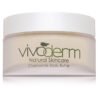 You can find almond oil in many natural skincare products today. Vivoderm uses Almond Oil in most of its natural facial lotions and body creams. The Vivoderm Chamomile Body Butter is a thick, rich all-over skin hydrator, perfect to protect your skin against for the cold, dry weather of winter.
You can find almond oil in many natural skincare products today. Vivoderm uses Almond Oil in most of its natural facial lotions and body creams. The Vivoderm Chamomile Body Butter is a thick, rich all-over skin hydrator, perfect to protect your skin against for the cold, dry weather of winter.
Grown in the wilderness of Brazil, the tree and bark of the bitter almond tree (Prunus amygdalus amara) was used for tanning, while the fruit and nut was used for cooking and frying. In those times, nuts were sorted out and the bitter ones were used for ethenic oils in perfumeries and for the creations of industrial usages. 
Due to the bitter acid of the nuts and the potential harm of constipation that was caused by the acid, especially in children, trees were cultivated to create a higher percent of sweet-tasting almonds. The almond trees originally started in minor Asia and then moved to China, the Mediterranean region, Spain, Malaga, Valencia, Island of Mallorca, southern France, southern Italy, Messina, Greece, North Africa, Algeria, Tunisia, Turkey, southern Russia, and the United States.
Bitter almonds (Geren amygdalus amara) consist of 30 to 50 percent fatty oils; 20 to 30 percent egg white; three to five percent sugar; two to three percent emulsion, lipase, and enzymes; and two to four percent amygdalin acid glycoside, which is converted into choline, asparagine, and vitamin C. Sweet almonds (Amygdalus dulcis) consists of 30 to 60 percent fatty sweet almond oil, 20 to 30 percent glucose, 10 percent saccharose, and two to three percent emulsifying and enzymatic properties. It is used in food, cosmetics, cough syrup, and other pharmaceutical preparations. A very small amount of bitter almond oil is still used in the bakery, pastry, candy, and liquor industries as it enhances and stimulates the taste of many products. In the preparation of food, almond oil can be used in salads and for cooking. A small amount of almond oil is often used to enhance flavors.
In the cosmetic industry, almond oil has many positive usages, including skin conditioning and enhancing the feel and penetration of facial creams, body lotions, hand and foot care, fragrance ingredients, soaps, cleansing products, hair care products, bath oils, sun tanning products, and makeup. The development of skin and body care products has unlimited possibilities with which to use almond oil to create a large variety of personal care products.
For corrective purposes, almond oil – as a carrier oil – is a neutral oil, therefore, it is used in many supplement recommendations. For muscle soreness and leg cramps, almond oil can be combined with a few drops of birch, borage, eucalyptus, evening primrose, ginger, lavender, peppermint, or wintergreen oils and rubbed on the ache or pain. To ease cramps in the calf muscle, rub the blend on the calf and flex the foot several times.
Blending lavender and chamomile oils with almond oil as a carrier can offer relief against sunburn. Almond oil as a carrier for chamomile oil is a remedy for many unpleasant occurrences.
Almond oil as a sedative is used in the pharmaceutical profession due to the following amino acids: alanine, magnesium, phenylalanine, and vitamin F. It is soothing and mollifying as a medicinal substance. Used internally, almond butter is tolerated by diabetics.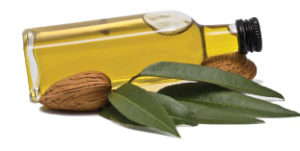
In many cases, the end price of a product determines the quality of the product. The purified almond oil used in cosmetic manufacturing is produced by grinding the kernel and pressing the oil out, whereby the bulk can be dried and used as abrasives in face and body masks or sold as sweet almond meal or sweet almond seed powder.
To take advantage of sweet almonds, there are several water-soluble extractions available: sweet almond flower extract, sweet almond bark extract, sweet almond bud extract, sweet almond fruit extract, and sweet almond fruit water. A sweet almond leaf cell extract was found to be a highly potent antioxidant skin protector. For hair conditioning, a combination of sweet almond protein and oil is very effective. One of almond oils biggest benefits is that it keeps the skin and hair looking great. It is considered a mild hypoallergenic oil that is safe for sensitive skin. When using the oil directly on the skin, which is done in some instances, it is wise to warm the oil to body temperature before use for better penetration into the skin. By combining almond oil with different essential oils, not only is the power of these oils tripled, but it also enhances the penetration since almond oil is considered an essential carrier oil in the skin care industry.
Folklore has offered many ideas and usages for the nut, which, of course, were never medically proven and registered. A few of these usages include helping to control ultraviolet radiation damage due to unprotected outdoor activity, helping to treat psoriasis and eczema, delaying general signs of aging, treating dark circles under the eyes, and helping with earaches in children.
Almond oil has a light, pleasant feel, but many people will reject the direct use of the oil as it leaves an oily look and feel to the skin.
There are nearly 20 different almonds worldwide. With the improvement of technologies and harvesting, processing techniques for California almonds are now used all over the world. California sweet almond oil can be blended with other oils or used by itself in major cosmetic production with unlimited benefits.
Author: Dr. Dieter Kuster. Originally published in Dermascope Magazine, Dec 2016
http://www.dermascope.com/resources/almond-oil



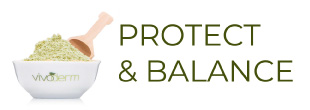
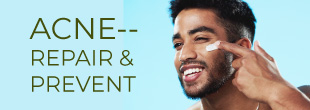
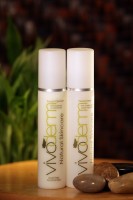



 If you suffer from sensitive or dry, delicate skin, you already know how difficult it can be to find a skin care product that does not cause a negative reaction. However, have you considered many other kinds of chemicals you are exposed to every day? Many unsuspecting products, like household cleaners, air pollution and even industrial chemicals in your furniture can induce inflammation in susceptible individuals. If you suffer from dry or sensitive skin, you are more at risk for reactions, especially if you are already experiencing extreme dryness or eczema symptoms.
If you suffer from sensitive or dry, delicate skin, you already know how difficult it can be to find a skin care product that does not cause a negative reaction. However, have you considered many other kinds of chemicals you are exposed to every day? Many unsuspecting products, like household cleaners, air pollution and even industrial chemicals in your furniture can induce inflammation in susceptible individuals. If you suffer from dry or sensitive skin, you are more at risk for reactions, especially if you are already experiencing extreme dryness or eczema symptoms.